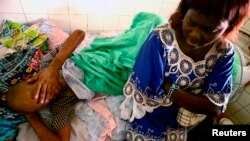A report released at the recent 45th World Conference on Lung Health in Barcelona, Spain calls for international intervention to stop a looming co-epidemic of diabetes and tuberculosis.
The study was released by the International Union Against Tuberculosis and Lung Disease and the World Diabetes Foundation.
It finds that diabetes triples the risk that a person will develop TB and that this growing trend, what researchers refer to as a perfect storm, could reverse the progress made against tuberculosis over the last few decades.
“Basically what’s happening is that globally the burden of diabetes is rising at a very fast pace. We estimate that there are about 382 million people with diabetes globally and that 80% of them live in low and middle income countries in the developing world where tuberculosis is also a major public health problem,” explained Dr. Anil Kapur, member of the Board of Directors of the World Diabetes Foundation.
He also pointed out that if you look at the top ten countries that have the most people with diabetes and the top 22 countries with highest incidences of tuberculosis you will find quite a few matches of people having both diseases.
“Typically these are highly populous countries like China, India, Indonesia, Pakistan, Bangladesh, Nigeria, Brazil, Russia. [They] account for roughly 60 percent of the burden of tuberculosis and roughly about 60-65 percent of the burden of diabetes. Therefore, it’s a perfect storm because if we do not recognize the global morbidity and start to act on it, we will actually undo the gains we have had in the area of tuberculosis control,” Kapur said.
He said people with high sugar levels have compromised immune systems and are more prone to infections – including tuberculosis. .
“Given the fact that roughly about one-third of the global population is already infected with tubercle bacillus, [a bacterium that is the major cause of tuberculosis], which lies in a dormant latent phase, when the immune status is low, it manifests as an active disease. Therefore, people with diabetes have a three times higher risk of getting active TB disease,” said Kapur.
His hope is that international leaders will take the results of the findings seriously and allocate more resources and funding to prevent and control diabetes at the primary care level. Kapur said policy makers need to be made aware that paying attention to early stage diabetes is as important as controlling the HIV epidemic.
“And unless we recognize it and start to deal with it, we might undo the gains in tuberculosis control,” he warned.




